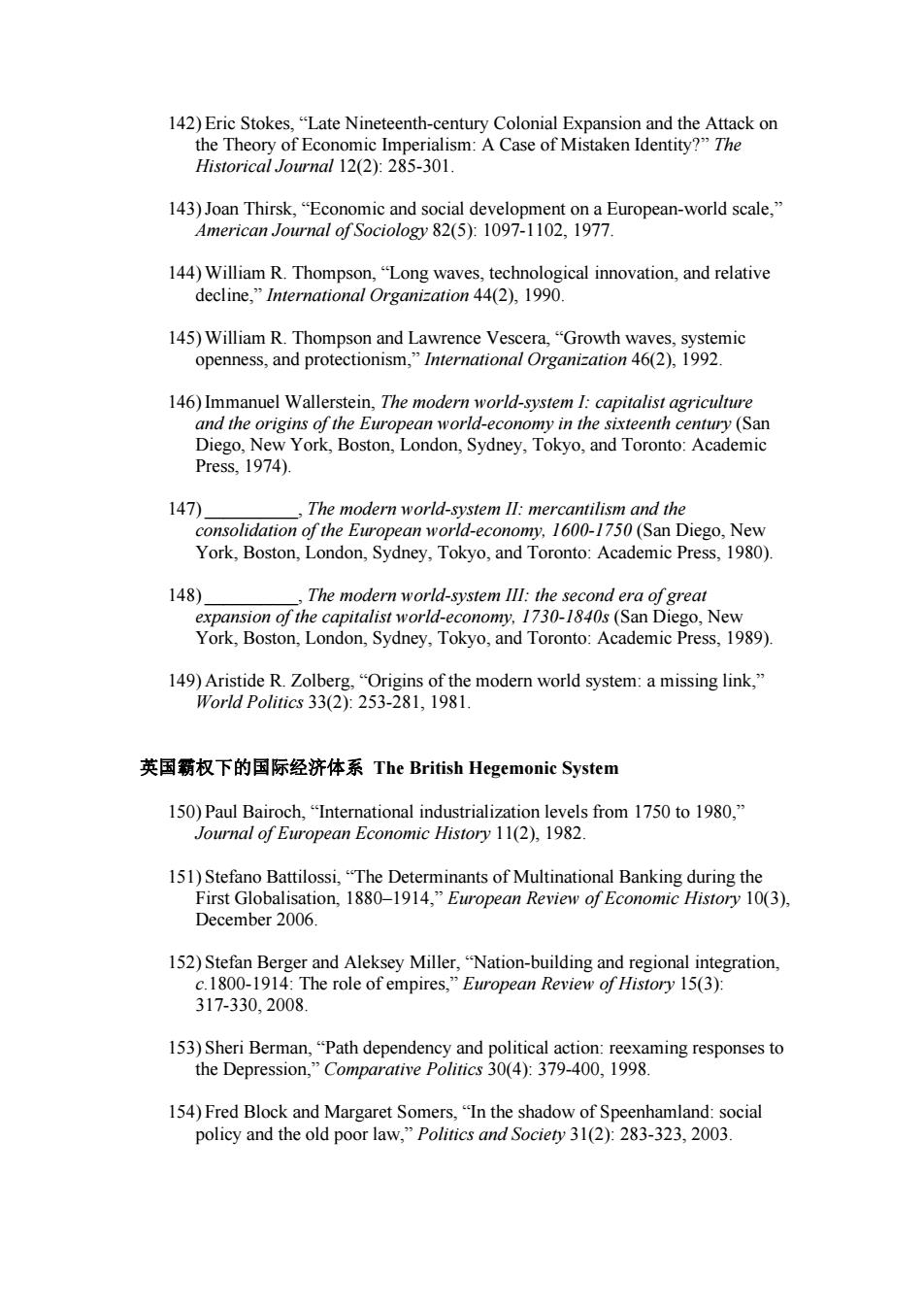
142)Eric Stokes,"Late Nineteenth-century Colonial Expansion and the Attack on the Theory of Economic Imperialism:A Case of Mistaken Identity?"The Historical Journal 12(2):285-301. 143)Joan Thirsk,"Economic and social development on a European-world scale," American Journal of Sociology 82(5):1097-1102,1977. 144)William R.Thompson,"Long waves,technological innovation,and relative decline,"International Organization 44(2),1990. 145)William R.Thompson and Lawrence Vescera,"Growth waves,systemic openness,and protectionism,"International Organization 46(2),1992. 146)Immanuel Wallerstein,The modern world-system I:capitalist agriculture and the origins of the European world-economy in the sixteenth century (San Diego,New York,Boston,London,Sydney,Tokyo,and Toronto:Academic Press,1974). 147) The modern world-system II:mercantilism and the consolidation of the European world-economy,1600-1750(San Diego,New York,Boston,London,Sydney,Tokyo,and Toronto:Academic Press,1980). 148) The modern world-system III:the second era of great expansion of the capitalist world-economy,1730-1840s (San Diego,New York,Boston,London,Sydney,Tokyo,and Toronto:Academic Press,1989). 149)Aristide R.Zolberg,"Origins of the modern world system:a missing link," World Politics 33(2):253-281,1981. 英国霸权下的国际经济体系The British Hegemonic System 150)Paul Bairoch,"International industrialization levels from 1750 to 1980," Journal of European Economic History 11(2),1982 151)Stefano Battilossi,"The Determinants of Multinational Banking during the First Globalisation,1880-1914,"European Review of Economic History 10(3), December 2006. 152)Stefan Berger and Aleksey Miller,"Nation-building and regional integration, c.1800-1914:The role of empires,"European Review of History 15(3): 317-330,2008. 153)Sheri Berman,"Path dependency and political action:reexaming responses to the Depression,"Comparative Politics 30(4):379-400,1998. 154)Fred Block and Margaret Somers,"In the shadow of Speenhamland:social policy and the old poor law,"Politics and Society 31(2):283-323,2003
142) Eric Stokes, “Late Nineteenth-century Colonial Expansion and the Attack on the Theory of Economic Imperialism: A Case of Mistaken Identity?” The Historical Journal 12(2): 285-301. 143)Joan Thirsk, “Economic and social development on a European-world scale,” American Journal of Sociology 82(5): 1097-1102, 1977. 144) William R. Thompson, “Long waves, technological innovation, and relative decline,” International Organization 44(2), 1990. 145) William R. Thompson and Lawrence Vescera, “Growth waves, systemic openness, and protectionism,” International Organization 46(2), 1992. 146) Immanuel Wallerstein, The modern world-system I: capitalist agriculture and the origins of the European world-economy in the sixteenth century (San Diego, New York, Boston, London, Sydney, Tokyo, and Toronto: Academic Press, 1974). 147) __________, The modern world-system II: mercantilism and the consolidation of the European world-economy, 1600-1750 (San Diego, New York, Boston, London, Sydney, Tokyo, and Toronto: Academic Press, 1980). 148) __________, The modern world-system III: the second era of great expansion of the capitalist world-economy, 1730-1840s (San Diego, New York, Boston, London, Sydney, Tokyo, and Toronto: Academic Press, 1989). 149) Aristide R. Zolberg, “Origins of the modern world system: a missing link,” World Politics 33(2): 253-281, 1981. 英国霸权下的国际经济体系 The British Hegemonic System 150) Paul Bairoch, “International industrialization levels from 1750 to 1980,” Journal of European Economic History 11(2), 1982. 151) Stefano Battilossi, “The Determinants of Multinational Banking during the First Globalisation, 1880–1914,” European Review of Economic History 10(3), December 2006. 152) Stefan Berger and Aleksey Miller, “Nation-building and regional integration, c.1800-1914: The role of empires,” European Review of History 15(3): 317-330, 2008. 153) Sheri Berman, “Path dependency and political action: reexaming responses to the Depression,” Comparative Politics 30(4): 379-400, 1998. 154) Fred Block and Margaret Somers, “In the shadow of Speenhamland: social policy and the old poor law,” Politics and Society 31(2): 283-323, 2003
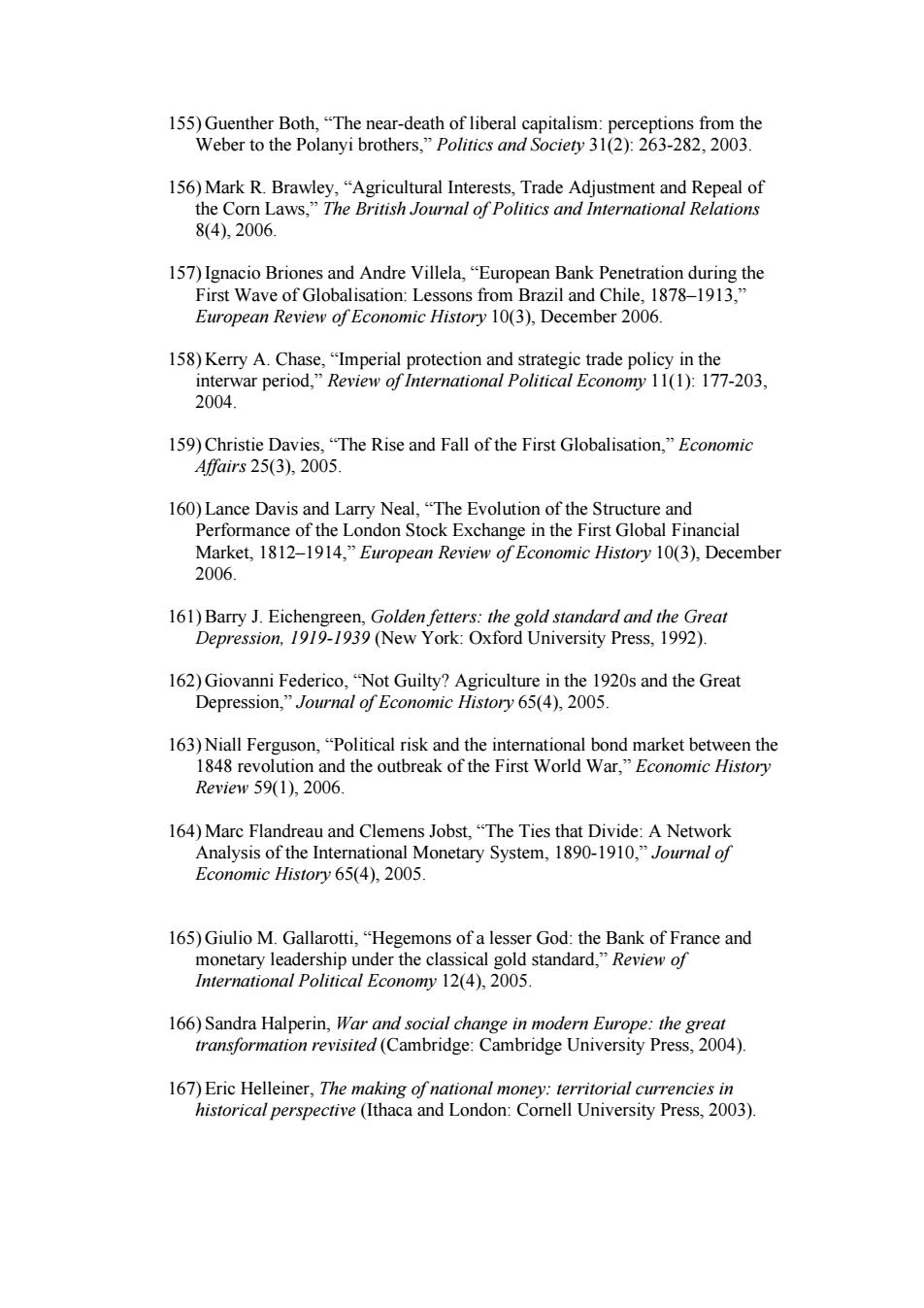
155)Guenther Both,"The near-death of liberal capitalism:perceptions from the Weber to the Polanyi brothers,"Politics and Society 31(2):263-282,2003. 156)Mark R.Brawley,"Agricultural Interests,Trade Adjustment and Repeal of the Corn Laws,"The British Journal of Politics and International Relations 8(4),2006. 157)Ignacio Briones and Andre Villela,"European Bank Penetration during the First Wave of Globalisation:Lessons from Brazil and Chile,1878-1913," European Review of Economic History 10(3),December 2006. 158)Kerry A.Chase,"Imperial protection and strategic trade policy in the interwar period,"Review of International Political Economy 11(1):177-203, 2004. 159)Christie Davies,"The Rise and Fall of the First Globalisation,"Economic Affairs25(3),2005 160)Lance Davis and Larry Neal,"The Evolution of the Structure and Performance of the London Stock Exchange in the First Global Financial Market,1812-1914,"European Review of Economic History 10(3),December 2006. 161)Barry J.Eichengreen,Golden fetters:the gold standard and the Great Depression,1919-1939(New York:Oxford University Press,1992) 162)Giovanni Federico,"Not Guilty?Agriculture in the 1920s and the Great Depression,"Journal of Economic History 65(4),2005 163)Niall Ferguson,"Political risk and the international bond market between the 1848 revolution and the outbreak of the First World War,"Economic History Review59(1),2006, 164)Marc Flandreau and Clemens Jobst,"The Ties that Divide:A Network Analysis of the International Monetary System,1890-1910,"Journal of Economic History 65(4),2005. 165)Giulio M.Gallarotti,"Hegemons of a lesser God:the Bank of France and monetary leadership under the classical gold standard,"Review of International Political Economy 12(4),2005. 166)Sandra Halperin,War and social change in modern Europe:the great transformation revisited (Cambridge:Cambridge University Press,2004) 167)Eric Helleiner,The making of national money:territorial currencies in historical perspective(Ithaca and London:Cornell University Press,2003)
155) Guenther Both, “The near-death of liberal capitalism: perceptions from the Weber to the Polanyi brothers,” Politics and Society 31(2): 263-282, 2003. 156) Mark R. Brawley, “Agricultural Interests, Trade Adjustment and Repeal of the Corn Laws,” The British Journal of Politics and International Relations 8(4), 2006. 157) Ignacio Briones and Andre Villela, “European Bank Penetration during the First Wave of Globalisation: Lessons from Brazil and Chile, 1878–1913,” European Review of Economic History 10(3), December 2006. 158) Kerry A. Chase, “Imperial protection and strategic trade policy in the interwar period,” Review of International Political Economy 11(1): 177-203, 2004. 159) Christie Davies, “The Rise and Fall of the First Globalisation,” Economic Af airs 25(3), 2005. 160) Lance Davis and Larry Neal, “The Evolution of the Structure and Performance of the London Stock Exchange in the First Global Financial Market, 1812–1914,” European Review of Economic History 10(3), December 2006. 161) Barry J. Eichengreen, Golden fetters: the gold standard and the Great Depression, 1919-1939 (New York: Oxford University Press, 1992). 162) Giovanni Federico, “Not Guilty? Agriculture in the 1920s and the Great Depression,” Journal of Economic History 65(4), 2005. 163) Niall Ferguson, “Political risk and the international bond market between the 1848 revolution and the outbreak of the First World War,” Economic History Review 59(1), 2006. 164) Marc Flandreau and Clemens Jobst, “The Ties that Divide: A Network Analysis of the International Monetary System, 1890-1910,” Journal of Economic History 65(4), 2005. 165) Giulio M. Gallarotti, “Hegemons of a lesser God: the Bank of France and monetary leadership under the classical gold standard,” Review of International Political Economy 12(4), 2005. 166) Sandra Halperin, War and social change in modern Europe: the great transformation revisited (Cambridge: Cambridge University Press, 2004). 167) Eric Helleiner, The making of national money: territorial currencies in historical perspective (Ithaca and London: Cornell University Press, 2003)
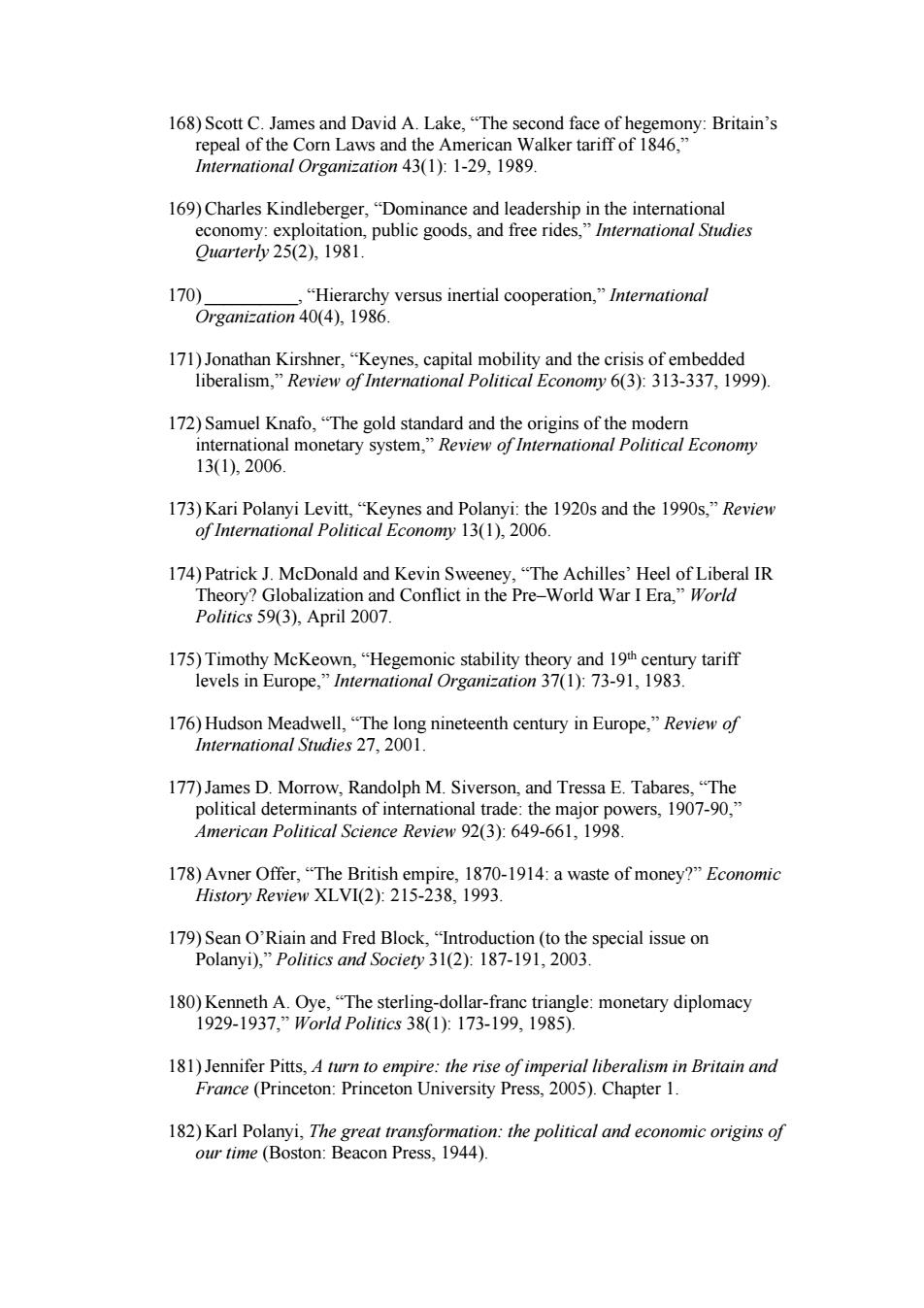
168)Scott C.James and David A.Lake,"The second face of hegemony:Britain's repeal of the Corn Laws and the American Walker tariff of 1846," International Organization 43(1):1-29,1989. 169)Charles Kindleberger,"Dominance and leadership in the international economy:exploitation,public goods,and free rides,"International Studies Quarterly 25(2),1981 170) "Hierarchy versus inertial cooperation,"International Organization 40(4),1986. 171)Jonathan Kirshner,"Keynes,capital mobility and the crisis of embedded liberalism,"Review of International Political Economy 6(3):313-337,1999). 172)Samuel Knafo,"The gold standard and the origins of the modern international monetary system,"Review of International Political Economy 13(1),2006. 173)Kari Polanyi Levitt,"Keynes and Polanyi:the 1920s and the 1990s,"Review of International Political Economy 13(1),2006. 174)Patrick J.McDonald and Kevin Sweeney,"The Achilles'Heel of Liberal IR Theory?Globalization and Conflict in the Pre-World War I Era,"World Politics 59(3),April 2007 175)Timothy McKeown,"Hegemonic stability theory and 19th century tariff levels in Europe,"International Organization 37(1):73-91,1983. 176)Hudson Meadwell,"The long nineteenth century in Europe,"Review of International Studies 27,2001 177)James D.Morrow,Randolph M.Siverson,and Tressa E.Tabares,"The political determinants of international trade:the major powers,1907-90," American Political Science Review 92(3):649-661,1998. 178)Avner Offer,"The British empire,1870-1914:a waste of money?"Economic History Review XLVI(2):215-238,1993. 179)Sean O'Riain and Fred Block,"Introduction(to the special issue on Polanyi),"Politics and Society 31(2):187-191,2003. 180)Kenneth A.Oye,"The sterling-dollar-franc triangle:monetary diplomacy 1929-1937,”World Politics38(1):173-199,1985). 181)Jennifer Pitts,A turn to empire:the rise of imperial liberalism in Britain and France(Princeton:Princeton University Press,2005).Chapter 1. 182)Karl Polanyi,The great transformation:the political and economic origins of our time (Boston:Beacon Press,1944)
168) Scott C. James and David A. Lake, “The second face of hegemony: Britain’s repeal of the Corn Laws and the American Walker tariff of 1846,” International Organization 43(1): 1-29, 1989. 169) Charles Kindleberger, “Dominance and leadership in the international economy: exploitation, public goods, and free rides,” International Studies Quarterly 25(2), 1981. 170) __________, “Hierarchy versus inertial cooperation,” International Organization 40(4), 1986. 171)Jonathan Kirshner, “Keynes, capital mobility and the crisis of embedded liberalism,” Review of International Political Economy 6(3): 313-337, 1999). 172) Samuel Knafo, “The gold standard and the origins of the modern international monetary system,” Review of International Political Economy 13(1), 2006. 173) Kari Polanyi Levitt, “Keynes and Polanyi: the 1920s and the 1990s,” Review of International Political Economy 13(1), 2006. 174) Patrick J. McDonald and Kevin Sweeney, “The Achilles’ Heel of Liberal IR Theory? Globalization and Conflict in the Pre–World War I Era,” World Politics 59(3), April 2007. 175) Timothy McKeown, “Hegemonic stability theory and 19 th century tariff levels in Europe,” International Organization 37(1): 73-91, 1983. 176) Hudson Meadwell, “The long nineteenth century in Europe,” Review of International Studies 27, 2001. 177)James D. Morrow, Randolph M. Siverson, and Tressa E. Tabares, “The political determinants of international trade: the major powers, 1907-90,” American Political Science Review 92(3): 649-661, 1998. 178) Avner Offer, “The British empire, 1870-1914: a waste of money?” Economic History Review XLVI(2): 215-238, 1993. 179) Sean O’Riain and Fred Block, “Introduction (to the special issue on Polanyi),” Politics and Society 31(2): 187-191, 2003. 180) Kenneth A. Oye, “The sterling-dollar-franc triangle: monetary diplomacy 1929-1937,” World Politics 38(1): 173-199, 1985). 181)Jennifer Pitts, A turn to empire: the rise of imperial liberalism in Britain and France (Princeton: Princeton University Press, 2005). Chapter 1. 182) Karl Polanyi, The great transformation: the political and economic origins of our time (Boston: Beacon Press, 1944)
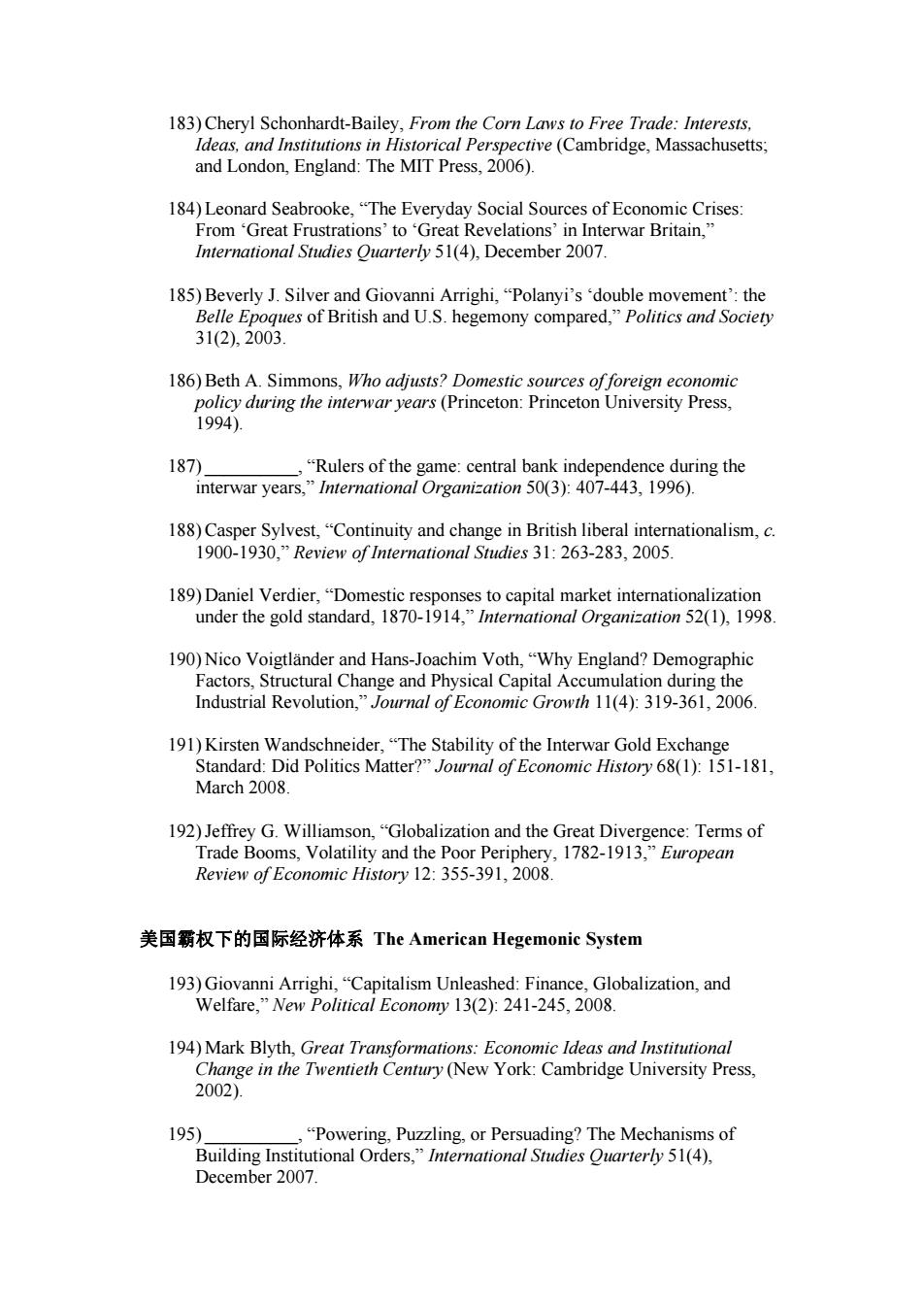
183)Cheryl Schonhardt-Bailey,From the Corn Laws to Free Trade:Interests, Ideas,and Institutions in Historical Perspective(Cambridge,Massachusetts; and London,England:The MIT Press,2006). 184)Leonard Seabrooke,"The Everyday Social Sources of Economic Crises: From 'Great Frustrations'to 'Great Revelations'in Interwar Britain," International Studies Quarterly 51(4),December 2007. 185)Beverly J.Silver and Giovanni Arrighi,"Polanyi's 'double movement':the Belle Epoques of British and U.S.hegemony compared,"Politics and Society 31(2),2003. 186)Beth A.Simmons,Who adjusts?Domestic sources of foreign economic policy during the interwar years (Princeton:Princeton University Press, 1994) 187) ,"Rulers of the game:central bank independence during the interwar years,"International Organization 50(3):407-443,1996). 188)Casper Sylvest,"Continuity and change in British liberal internationalism,c. 1900-1930,"Review of International Studies 31:263-283,2005 189)Daniel Verdier,"Domestic responses to capital market internationalization under the gold standard,1870-1914,"International Organization 52(1),1998. 190)Nico Voigtlander and Hans-Joachim Voth,"Why England?Demographic Factors,Structural Change and Physical Capital Accumulation during the Industrial Revolution,"Journal of Economic Growth 11(4):319-361,2006. 191)Kirsten Wandschneider,"The Stability of the Interwar Gold Exchange Standard:Did Politics Matter?"Journal of Economic History 68(1):151-181, March 2008. 192)Jeffrey G.Williamson,"Globalization and the Great Divergence:Terms of Trade Booms,Volatility and the Poor Periphery,1782-1913,"European Review of Economic History 12:355-391,2008. 美国霸权下的国际经济体系The American Hegemonic System 193)Giovanni Arrighi,"Capitalism Unleashed:Finance,Globalization,and Welfare,"New Political Economy 13(2):241-245,2008. 194)Mark Blyth,Great Transformations:Economic Ideas and Institutional Change in the Twentieth Century (New York:Cambridge University Press, 2002). 195) "Powering,Puzzling,or Persuading?The Mechanisms of Building Institutional Orders,"International Studies Ouarterly 51(4), December 2007
183) Cheryl Schonhardt-Bailey, From the Corn Laws to Free Trade: Interests, Ideas, and Institutions in Historical Perspective (Cambridge, Massachusetts; and London, England: The MIT Press, 2006). 184) Leonard Seabrooke, “The Everyday Social Sources of Economic Crises: From ‘Great Frustrations’ to ‘Great Revelations’ in Interwar Britain,” International Studies Quarterly 51(4), December 2007. 185) Beverly J. Silver and Giovanni Arrighi, “Polanyi’s ‘double movement’: the Belle Epoques of British and U.S. hegemony compared,” Politics and Society 31(2), 2003. 186) Beth A. Simmons, Who adjusts? Domestic sources of foreign economic policy during the interwar years (Princeton: Princeton University Press, 1994). 187) __________, “Rulers of the game: central bank independence during the interwar years,” International Organization 50(3): 407-443, 1996). 188) Casper Sylvest, “Continuity and change in British liberal internationalism, c. 1900-1930,” Review of International Studies 31: 263-283, 2005. 189) Daniel Verdier, “Domestic responses to capital market internationalization under the gold standard, 1870-1914,” International Organization 52(1), 1998. 190) Nico Voigtländer and Hans-Joachim Voth, “Why England? Demographic Factors, Structural Change and Physical Capital Accumulation during the Industrial Revolution,” Journal of Economic Growth 11(4): 319-361, 2006. 191) Kirsten Wandschneider, “The Stability of the Interwar Gold Exchange Standard: Did Politics Matter?” Journal of Economic History 68(1): 151-181, March 2008. 192)Jeffrey G. Williamson, “Globalization and the Great Divergence: Terms of Trade Booms, Volatility and the Poor Periphery, 1782-1913,” European Review of Economic History 12: 355-391, 2008. 美国霸权下的国际经济体系 The American Hegemonic System 193) Giovanni Arrighi, “Capitalism Unleashed: Finance, Globalization, and Welfare,” New Political Economy 13(2): 241-245, 2008. 194) Mark Blyth, Great Transformations: Economic Ideas and Institutional Change in the Twentieth Century (New York: Cambridge University Press, 2002). 195) __________, “Powering, Puzzling, or Persuading? The Mechanisms of Building Institutional Orders,” International Studies Quarterly 51(4), December 2007
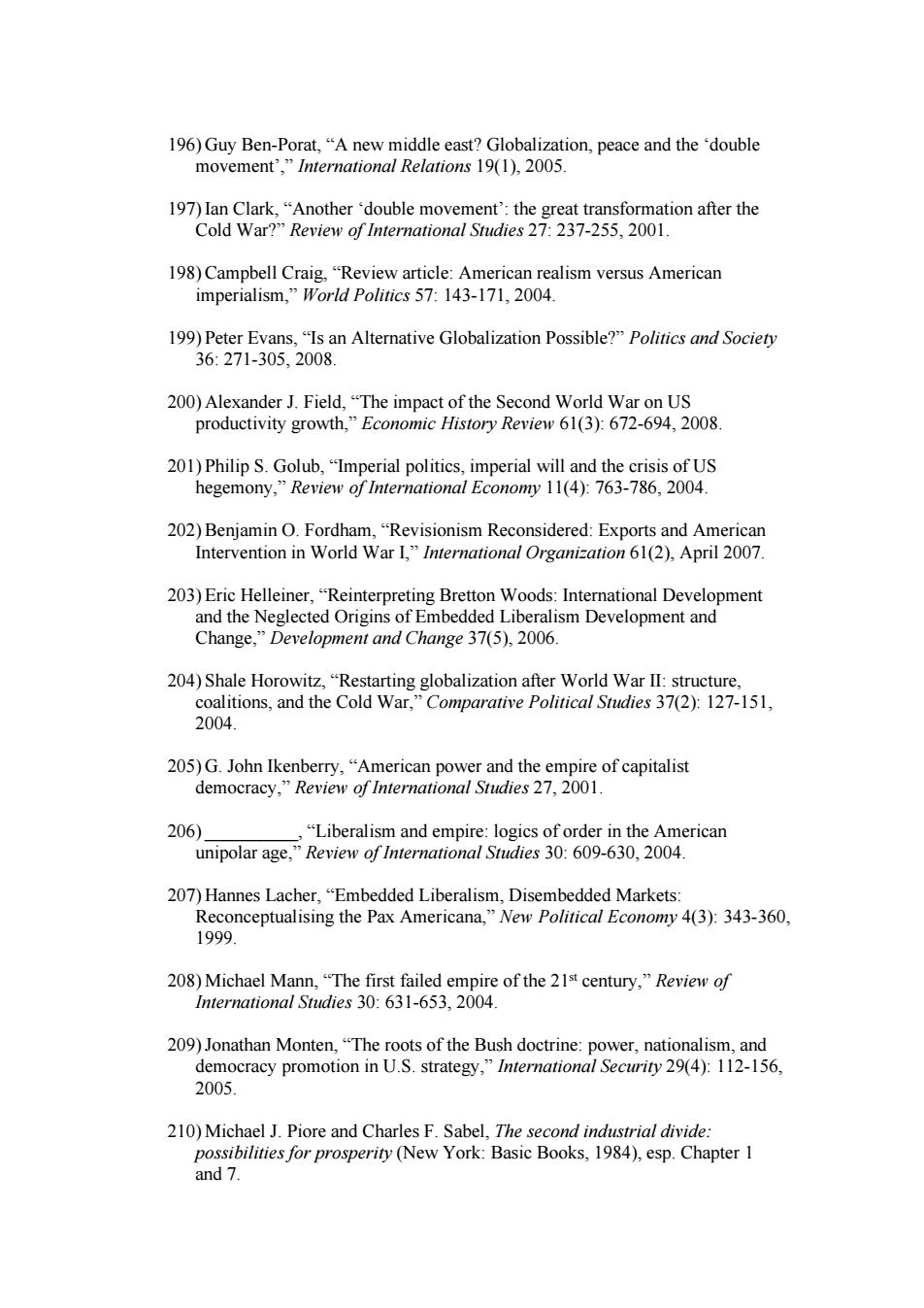
196)Guy Ben-Porat,"A new middle east?Globalization,peace and the double movement',"International Relations 19(1),2005. 197)lan Clark,"Another 'double movement':the great transformation after the Cold War?"Review of International Studies 27:237-255,2001. 198)Campbell Craig,"Review article:American realism versus American imperialism,"World Politics 57:143-171,2004. 199)Peter Evans,"Is an Alternative Globalization Possible?"Politics and Society 36:271-305,2008. 200)Alexander J.Field,"The impact of the Second World War on US productivity growth,"Economic History Review 61(3):672-694,2008. 201)Philip S.Golub,"Imperial politics,imperial will and the crisis of US hegemony,"Review of International Economy 11(4):763-786,2004. 202)Benjamin O.Fordham,"Revisionism Reconsidered:Exports and American Intervention in World War I,"International Organization 61(2),April 2007. 203)Eric Helleiner,"Reinterpreting Bretton Woods:International Development and the Neglected Origins of Embedded Liberalism Development and Change,"Development and Change 37(5),2006 204)Shale Horowitz,"Restarting globalization after World War II:structure, coalitions,and the Cold War,"Comparative Political Studies 37(2):127-151, 2004 205)G.John Ikenberry,"American power and the empire of capitalist democracy,"Review of International Studies 27,2001. 206) "Liberalism and empire:logics of order in the American unipolar age,"Review of International Studies 30:609-630,2004. 207)Hannes Lacher,"Embedded Liberalism,Disembedded Markets: Reconceptualising the Pax Americana,"New Political Economy 4(3):343-360, 1999. 208)Michael Mann,"The first failed empire of the 21st century,"Review of International Studies 30:631-653,2004. 209)Jonathan Monten,"The roots of the Bush doctrine:power,nationalism,and democracy promotion in U.S.strategy,"International Security 29(4):112-156, 2005. 210)Michael J.Piore and Charles F.Sabel,The second industrial divide: possibilities for prosperity (New York:Basic Books,1984),esp.Chapter 1 and 7
196) Guy Ben-Porat, “A new middle east? Globalization, peace and the ‘double movement’,” International Relations 19(1), 2005. 197) Ian Clark, “Another ‘double movement’: the great transformation after the Cold War?” Review of International Studies 27: 237-255, 2001. 198) Campbell Craig, “Review article: American realism versus American imperialism,” World Politics 57: 143-171, 2004. 199) Peter Evans, “Is an Alternative Globalization Possible?” Politics and Society 36: 271-305, 2008. 200) Alexander J. Field, “The impact of the Second World War on US productivity growth,” Economic History Review 61(3): 672-694, 2008. 201) Philip S. Golub, “Imperial politics, imperial will and the crisis of US hegemony,” Review of International Economy 11(4): 763-786, 2004. 202) Benjamin O. Fordham, “Revisionism Reconsidered: Exports and American Intervention in World War I,” International Organization 61(2), April 2007. 203) Eric Helleiner, “Reinterpreting Bretton Woods: International Development and the Neglected Origins of Embedded Liberalism Development and Change,” Development and Change 37(5), 2006. 204) Shale Horowitz, “Restarting globalization after World War II: structure, coalitions, and the Cold War,” Comparative Political Studies 37(2): 127-151, 2004. 205) G. John Ikenberry, “American power and the empire of capitalist democracy,” Review of International Studies 27, 2001. 206) __________, “Liberalism and empire: logics of order in the American unipolar age,” Review of International Studies 30: 609-630, 2004. 207) Hannes Lacher, “Embedded Liberalism, Disembedded Markets: Reconceptualising the Pax Americana,” New Political Economy 4(3): 343-360, 1999. 208) Michael Mann, “The first failed empire of the 21 st century,” Review of International Studies 30: 631-653, 2004. 209)Jonathan Monten, “The roots of the Bush doctrine: power, nationalism, and democracy promotion in U.S. strategy,” International Security 29(4): 112-156, 2005. 210) Michael J. Piore and Charles F. Sabel, The second industrial divide: possibilities for prosperity (New York: Basic Books, 1984), esp. Chapter 1 and 7